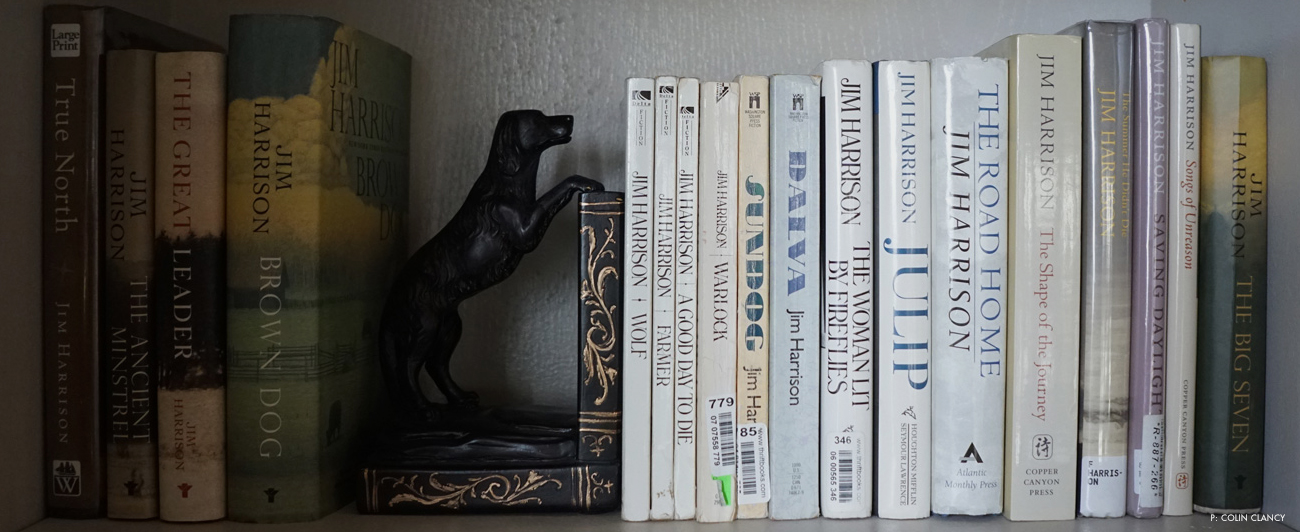Reads
Essential Jim Harrison – A Reading List
I could read nothing but Jim Harrison for the rest of my life and not give it a second thought. For a lover of dogs, food, fishing and spending great deals of time wandering in the woods, Harrison’s prolific bibliography contains enough deeply developed characters, layered imagery and engrossing prose to read it all start to finish and happily start it all over again. His only work still in print that I have yet to read is his children’s book, “The Boy Who Ran to the Woods,” which I’m saving for the birth of my son five months from now.
There is plenty of Harrison writing out there distinctly about his love of flyfishing, notably the essay “Older Fishing” from the 2012 anthology, Astream (“The first three minutes of hooking a 250-pound striped marlin on a fly rod is all grunts and howls, but then so is a two-pound brook trout in a beaver pond or a five-pound brown in a river.”); and his 1970s and ‘80s sporting journalism in publications like Sports Illustrated, Playboy and Esquire (“The leader popped. It was like fly-fishing for Dick Butkus or a Harley Davidson,” he writes in his essay, “A Sporting Life”). But it’s in much of his fiction and poetry that his deep, spiritual love for wild places and creatures really comes through.
Harrison knew better than anyone that fishing, at its simplest, is an excuse to be on the water, observing and participating in the natural world. While these works aren’t all directly related to flyfishing, they are some of my favorites, that any fly angler is sure to appreciate.
Brown Dog, 2013
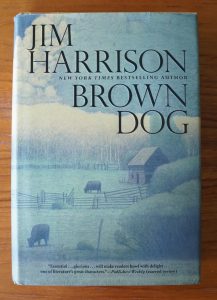 For me, the recurring character Brown Dog is right up there with Huckleberry Finn as one of the greatest character in all of American literature. Having spent the better part of a decade living in Harrison’s beloved Upper Peninsula, I’ve met many people who could have been the inspiration for the character. Brown Dog is somewhat of a fuckup; but he’s also a good guy that couldn’t care less what you think of him. He hides pints of schnapps in the woods for rainy days and loves nothing more than catching a few beaver pond brookies on the fly for dinner. From stealing a refrigerator truck to transport a dead body found while salvage diving Lake Superior, to avoiding a bar brawl by tricking his would-be attackers into going after each other, Brown Dog’s misadventures always have you rooting for him even when he’s in the wrong. After having been laid off from more than one copywriting job in the last few years, I’ve taken solace in the B.D. line, “you’ll never starve if you’re a good shovel man”—which my wife doesn’t find funny. The first five Brown Dog novellas were published between 1990 and 2010. When Harrison published the 2013 collection, Brown Dog, he included a sixth, and possibly best, B.D. novella.
For me, the recurring character Brown Dog is right up there with Huckleberry Finn as one of the greatest character in all of American literature. Having spent the better part of a decade living in Harrison’s beloved Upper Peninsula, I’ve met many people who could have been the inspiration for the character. Brown Dog is somewhat of a fuckup; but he’s also a good guy that couldn’t care less what you think of him. He hides pints of schnapps in the woods for rainy days and loves nothing more than catching a few beaver pond brookies on the fly for dinner. From stealing a refrigerator truck to transport a dead body found while salvage diving Lake Superior, to avoiding a bar brawl by tricking his would-be attackers into going after each other, Brown Dog’s misadventures always have you rooting for him even when he’s in the wrong. After having been laid off from more than one copywriting job in the last few years, I’ve taken solace in the B.D. line, “you’ll never starve if you’re a good shovel man”—which my wife doesn’t find funny. The first five Brown Dog novellas were published between 1990 and 2010. When Harrison published the 2013 collection, Brown Dog, he included a sixth, and possibly best, B.D. novella.
The River Swimmer, 2013
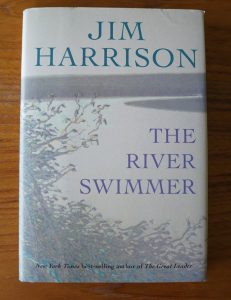 In the second, title novella of this 2013 collection, a young man runs from, and toward, the rigors of adulthood by swimming incredibly long distances in the rivers and lakes of Michigan. A touch of magic realism gives this book an escapist and surreal quality that keeps it fresh in your mind for weeks after putting it down. While not about fishing, the book captures the beauty and magic that anglers find in moving water. Plus, it’s full of profound nuggets like this one:
In the second, title novella of this 2013 collection, a young man runs from, and toward, the rigors of adulthood by swimming incredibly long distances in the rivers and lakes of Michigan. A touch of magic realism gives this book an escapist and surreal quality that keeps it fresh in your mind for weeks after putting it down. While not about fishing, the book captures the beauty and magic that anglers find in moving water. Plus, it’s full of profound nuggets like this one:
“He himself was quite spiritual in an eccentric way based on all of his reading in the life sciences and astronomy wherein everything seemed to be too monstrously intricate to be accidental whether it was avian vision and migration or the sheer fact of ninety billion galaxies.”
In Search of Small Gods, 2010
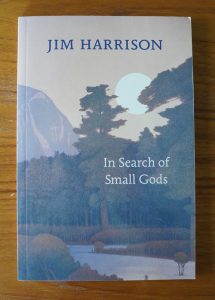 Perhaps the most accessible book of poetry out there for anyone who prefers to spend their time outdoors, this volume is full of rich, sensory poems will leave you wanting to slow down and chew on every single word. The “small gods” of which Harrison writes are the fish, birds and creatures seen and unseen that inhabit the natural world. When reading poetry, I dog-ear the poems that really speak to me, typically one or two per book. This one is dog-eared on damn near every page. One such page includes this stanza from “The Golden Window”:
Perhaps the most accessible book of poetry out there for anyone who prefers to spend their time outdoors, this volume is full of rich, sensory poems will leave you wanting to slow down and chew on every single word. The “small gods” of which Harrison writes are the fish, birds and creatures seen and unseen that inhabit the natural world. When reading poetry, I dog-ear the poems that really speak to me, typically one or two per book. This one is dog-eared on damn near every page. One such page includes this stanza from “The Golden Window”:
I hope to define my life, whatever is left,
by migrations, south and north with the birds
and far from the metallic fever of clocks,
the self staring at the clock saying, “I must do this.”
I can’t tell the time on the tongue of the river
in the cool morning air, the smell of the ferment
of greenery, the dust off the canyon’s rock walls,
the swallows swooping above the scent of raw water.
A Good Day to Die, 1973
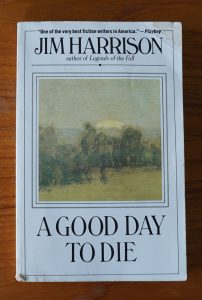 Who among us hasn’t looked at some monstrosity of a dam and wished it gone? A raw work from Harrison’s early career, A Good Day to Die chronicles the attempted destruction of a dam fueled by excesses of booze, drugs and sex. But that plot is merely a set of guiderails for Harrison’s textbook building and weaving of complex characters with fully-realized backstories. At just 176 pages, it’s a read-it-in-a-weekend book that runs the throttle wide open start to finish. It starts with the line: “Double-anchored off Cudjoe Key: barely dawn and she’s still asleep but I was awakened by water birds,”—and doesn’t let up.
Who among us hasn’t looked at some monstrosity of a dam and wished it gone? A raw work from Harrison’s early career, A Good Day to Die chronicles the attempted destruction of a dam fueled by excesses of booze, drugs and sex. But that plot is merely a set of guiderails for Harrison’s textbook building and weaving of complex characters with fully-realized backstories. At just 176 pages, it’s a read-it-in-a-weekend book that runs the throttle wide open start to finish. It starts with the line: “Double-anchored off Cudjoe Key: barely dawn and she’s still asleep but I was awakened by water birds,”—and doesn’t let up.
See The Flyfish Journal Volume 11, Issue 3 for The Salad Days, a feature on Jim Harrison, Russell Chatham, Tom McGuane and Guy de la Valdène and their escapades in the late 80’s in the Florida Keys from photographer Stephen Collector.
